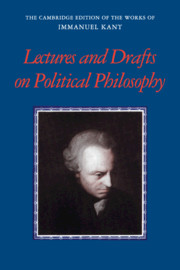Book contents
- Frontmatter
- Contents
- General Editors’ Preface
- Acknowledgments
- General Introduction
- Translators’ Remarks
- Reflections on the Philosophy of Right
- Natural Right Course Lecture Notes by Feyerabend
- Drafts for Published Works
- Drafts for Theory and Practice
- Drafts for Towards Perpetual Peace
- Drafts for the Metaphysics of Morals
- Drafts for Conflict of the Faculties
- Glossary
- Topical and Chronological Concordance
- Editorial Notes
- Index
Editor’s Introduction
Published online by Cambridge University Press: 10 December 2020
- Frontmatter
- Contents
- General Editors’ Preface
- Acknowledgments
- General Introduction
- Translators’ Remarks
- Reflections on the Philosophy of Right
- Natural Right Course Lecture Notes by Feyerabend
- Drafts for Published Works
- Drafts for Theory and Practice
- Drafts for Towards Perpetual Peace
- Drafts for the Metaphysics of Morals
- Drafts for Conflict of the Faculties
- Glossary
- Topical and Chronological Concordance
- Editorial Notes
- Index
Summary
Kant wrote to his friend Johann Heinrich Tieftrunk on Friday, October 13, 1797, with morbidity on his mind. After discussing Tieftrunk's proposal to publish a collection of Kant's minor writings, he writes,
It is possible that death will overtake me before these matters are settled. If so, our Professor Gensichen will find two of my essays in my cabinet; one of them is complete, the other almost so, and they have lain there for more than two years. Professor Gensichen will then tell you how to make use of them. But keep this matter confidential, for possibly I shall still publish them myself while I live. (12:208)
Kant scholars have generally identified these two essays as the first and second parts of what later became the Conflict of the Faculties. Prior to 1798, Kant had not yet conceived of the published work that united three essays on the relation between the philosophy faculty on the one hand and the theology, law, and medical faculties on the other, so he would have treated the first two parts as distinct essays.Other indications, however, suggest that Kant did not leave the essay, titled “An old question raised again: Is the human race constantly progressing?,” in his cabinet drawer but had submitted the essay for publication earlier in the month. In a draft of this same letter Kant notes that “a treatise of mine for the Berliner Blätter has been sent off” (13:464), and the “old question” essay is clearly identified by that precise title as that treatise in another letter to Tieftrunk of April 5, 1798, when Kant complains that the censors had quickly and quietly rejected it for publication in the Berliner Blätter on October 23, 1797 (12:240).Whether Kant had a copy of this essay in his drawer or not, from these sources it is clear that any drafts of this essay would date prior to October 1797, possibly coinciding with work on the Doctrine of Right and probably not afterward.
A beginning date for work on this essay is more difficult to pinpoint. Since the essay prominently features the French Revolution as an anchor for the claim that humanity is progressing, it cannot be earlier than 1789.
- Type
- Chapter
- Information
- Kant: Lectures and Drafts on Political Philosophy , pp. 357 - 358Publisher: Cambridge University PressPrint publication year: 2016

